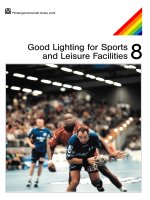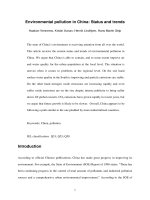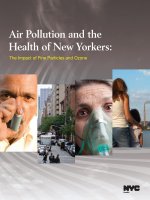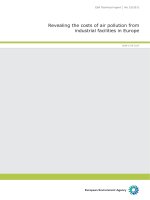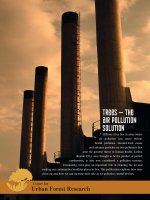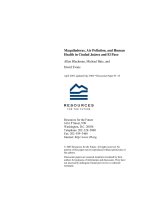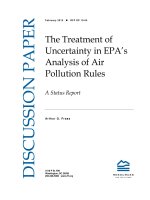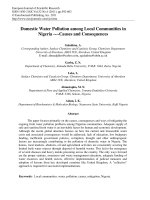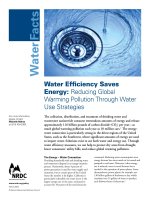Light Pollution Shaina Meyer pot
Bạn đang xem bản rút gọn của tài liệu. Xem và tải ngay bản đầy đủ của tài liệu tại đây (10.69 MB, 15 trang )
Light Pollution
Light Pollution
Shaina Meyer
What is light pollution?
• The alteration of the natural quantity of light in
the night environment due to the introduction of
excess artificial light
• Should be able to see around 2,500 stars under
normal nighttime conditions
• Types
– Light Trespass
– Glare
– Over-illumination
– Sky Glow
New York City
Hong Kong
The World At Night
source:
Effects of Light Pollution
• Wastes energy
• Causes adverse health effects in humans
• Obscures view of the stars
• Interferes with astronomical observatories
• Disrupts ecosystems
Black-Capped Chickadee
Effects on Animal Behavior
Light Pollution…
• Disrupts visual orientation and ability to navigate
• Stimulates unusual behavior for season/time of day
Studies have shown these effects in:
• Insects
• Salamanders
• Frogs
• Turtles
• Birds
green turtle hatchling
Migratory Bird Navigation
Birds find their way by…
• Using the position of the sun during the day, the stars at night
• Sensing magnetic north
• Using other clues such as
– visual layout of the land
– smell (ex. sea)
– sound (ex. waves on shores, winds through mountain passes)
*Scientists do not really know which migration technique birds rely on most
• Location, route, and maybe techniques of migration are hard-wired into their
brains
We are learning more about migration w/ better technology
– satellite transmitters
– GPS units
Light Pollution & Birds
• Hundreds of species of migrating birds fly at night including most
songbirds and shorebirds
• Rely on constellations to guide them during seasonal migration
Problems:
– Sky glow reduces view of constellations
– Flying near bright lights of urban areas may short-circuit steering sense
• Birds fly off course toward lights on buildings, towers, lighthouses
• Birds attracted to light
– Reasons unclear – possibly use light as a reference
• When birds suddenly reach light’s source, become confused/blinded
• Cause birds to slam into windows, walls, floodlights, the ground
• Problem particularly acute w/ bad weather like rain or fog
“Tribute in Light”
• In constant lights birds
circle and hover in and
around lights
– Believed to be trying to
orient their flight to the light
which they mistake for the
moon or stars
– Over time build-up of
migrants all trying to adjust
course
– Increase chance of hitting
each other or falling from
exhaustion
The white streaks in this image are in fact birds
trapped in the "Tribute in Light" spots at the
Ground Zero Memorial on September 11, 2004.
North America At Night
North American Migration Flyways
source:
source: />FLAP
• Fatal Light Awareness
Program (FLAP)
– Toronto organization
trying to publicize problem
– Estimate at least 100
million birds killed
annually by manmade
structures
– Believe songbirds most at
risk b/c they fly at low
altitudes dominated by
artificial light
Song Sparrow
Bird Casualties Fall 2004
source:
source:
Graph shows the average
number of migratory
birds collected on each
day of the year (numbers
calculated using data
compiled over 7 years)
Average Number of Migratory Birds Collected (2000-2006)
43379652006
342813402005
191511312004
214911022003
272612022002
23477332001
13269762000
Fall
Migratio
n
Spring
Migratio
n
Year
Migratory Birds Collected
Solutions
Increasing awareness about the consequences of light pollution will
encourage people to…
• Use different types of lighting
– Shielded
– Motion sensors
• Reduce amount/intensity of lighting
• Block lighting from outside environment
– ex. Genzyme
*International Dark-Sky Association (IDA) at www.darksky.org
How this helps birds:
• Research in Toronto and Washington, D.C. shows when building
lights dimmed/turned off number of bird fatalities drops dramatically
– Tower without lights causes bird collisions but at least not attracting
more birds
Birds & Light Pollution Model
What is already being done to
reduce light pollution?
• Light pollution credit for LEED Green Building Rating from the USGBC
– The intent of this credit is to “minimize light trespass from the building and site,
reduce sky-glow to increase night sky access, improve nighttime visibility through
glare reduction, and reduce development impact on nocturnal environments.”
• FLAP launched 12-step bird-friendly program that encourages buildings to
turn down lights during migrations
– Adopted at 100 buildings in downtown Toronto since 1997
– Trying to raise awareness in Chicago and New York as well
• Educational drives to publicize impact of light on turtle hatchlings and
seabird fledglings
– Sponsored by National Park Service in Hawaii and county governments in
Florida
• Lawmakers in hundreds of communities passed ordinances restricting
lighting types, power, use
– States including Texas, New Mexico, Arizona, Connecticut, Maine, California
implement statewide light restriction programs
• National impact of programs is minimal, but it’s a start
